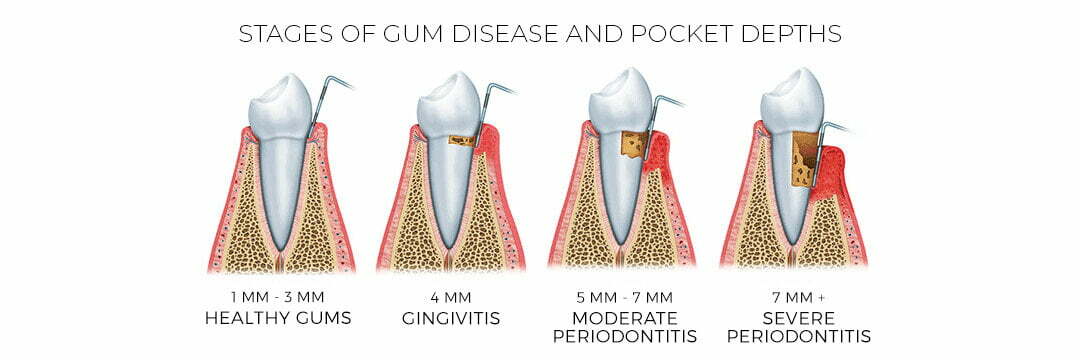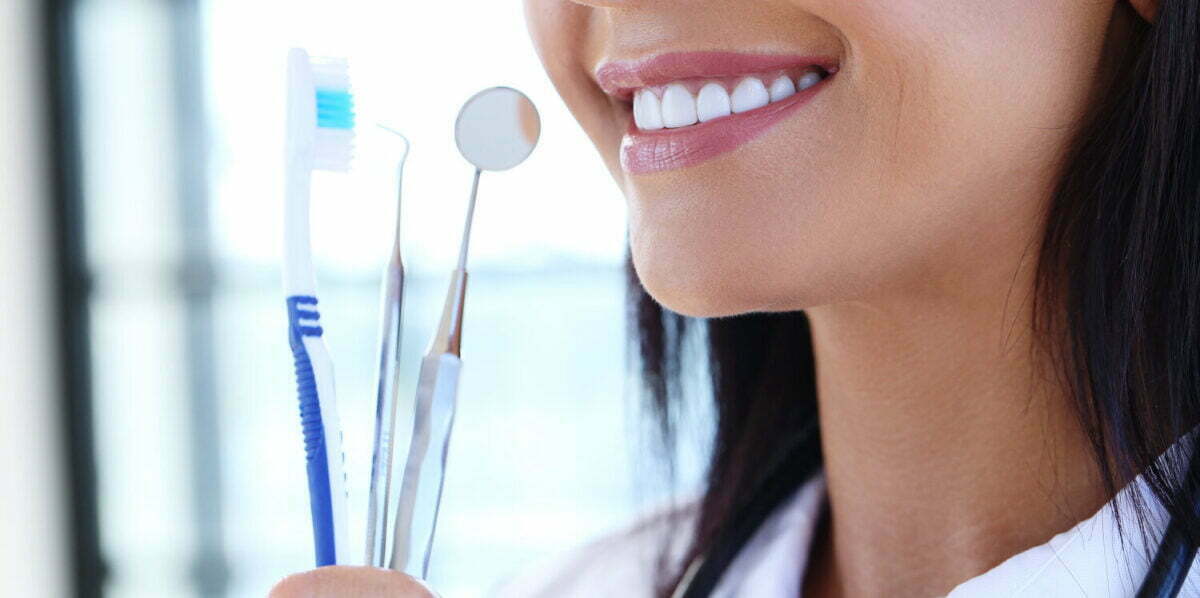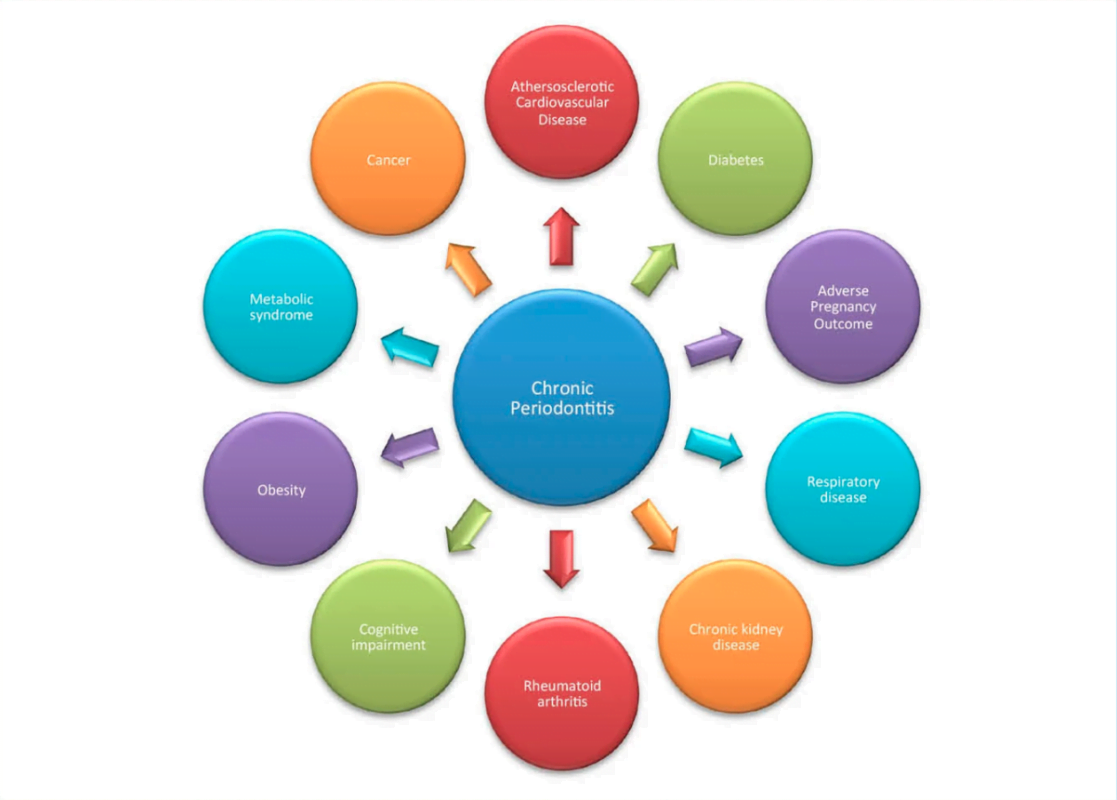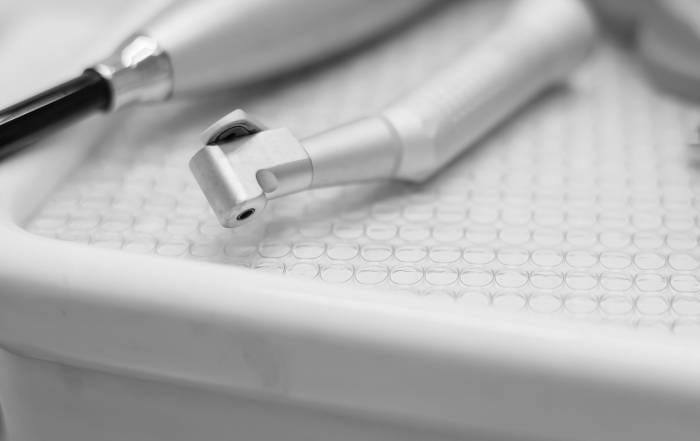This month, we'd like to shed some light on the importance of taking care of your gums, and the bone that supports your teeth (aka your periodontium). The health and maintenance of your periodontium is as every bit important as the health of your teeth themselves. Without healthy support (in the form of gums and bone), teeth will not have the strength and stability they require to function properly.
What does it mean to maintain our periodontal health? Why is it important, and how do we go about doing it?
There are a few different ways your periodontium can present when you attend our office:
-
Healthy
-
Gingivitis
-
Periodontal disease (a.k.a. Periodontitis)
One of our objectives as your dental health provider is to have you attend our office with healthy periodontium. This means there is no inflammation in the gums surrounding the teeth. Any signs of inflammation in the gums is an indication of a disease state. Gingivitis and periodontal disease are the two most common forms of disease of the gums and bone supporting the teeth.
Periodontium presenting as healthy.
Gingivitis
Gingivitis is a form of gum disease that happens when plaque, a naturally-occurring sticky film containing bacteria, builds up on teeth and causes the inflammation of the surrounding gum tissue. Plaque produces toxins that irritate the gums. This can cause the gums to become inflamed (appearing red or puffy) and cause them to bleed. This harmful plaque bacteria can even lead to issues beyond gingivitis, such as tooth decay (cavities). When brushing and flossing, it's important to make sure you're taking care of your gum line, because a healthy mouth starts there. Bleeding and swollen gums are evidence of gingivitis in one's mouth. If left untreated, it can lead to a more substantial form of disease in our mouth: periodontal disease.
Periodontal Disease
Periodontal disease (a.k.a. periodontitis) is also caused by the bacteria in dental plaque. Interestingly, it is your body's response to the bacterial infection that causes most of the problems. To eliminate the bacteria that are living in the plaque, your body creates an inflammatory response. In some of us, this inflammatory response does more damage to our own tissue than the bacteria itself. Our body's inflammatory blood cells can destroy the bone and the soft tissue that is attached to our teeth. It is the loss of these vital supporting structures that we term periodontal disease.
Periodontitis can range from mild to severe. If you suffer from severe periodontitis, your teeth can become so loose that they have to be extracted. The bad news is, if an individual develops periodontal disease, it is a disease that will remain with them for life. Periodontitis requires lifelong monitoring and maintenance — much like diabetes. The good news is periodontitis can be successfully managed with good oral hygiene at home, as well as regular visits to your dental hygienist for professional cleanings.
Taking Care of Your Periodontal Health is a Joint Effort
More than half of the battle to keep your periodontium healthy is in your hands. Brushing twice daily and flossing once daily, when done correctly, will remove most of the plaque from your teeth. Doing a good job at home will minimize your risk for gingivitis and periodontal disease. However, almost always, a very small amount of plaque will be left along the gumline — even when done extremely well, brushing and flossing doesn't always eliminate 100% of the plaque.
It is the plaque-residue left in our mouths that causes gingivitis, and periodontitis. The plaque build-up along the gumline eventually spreads below the gumline. There the bacteria are protected, because your toothbrush can't reach them. Flossing may help dislodge this plaque, but if it is not removed, the bacteria will continue to multiply, causing greater infection and inflammation. As the gum tissues become more swollen, they detach from the tooth forming a space, or "pocket" between the tooth and gums. A snowball effect can occur, as the pocket encourages further plaque accumulation. This is where a dental professional has to step in.
The best defense against periodontal disease is a healthy brushing and flossing routine, paired with regular dental hygiene appointments.
Our Role
Your dental hygienist will manage the plaque that is missed with your at-home cleaning regimen. Whether or not you have periodontitis and pocketing, regular visits for professional cleanings play a crucial role in ensuring your dental health. Based on your needs, your hygienist will provide you with invaluable instructions to care for your teeth at home, and provide you with regularly scheduled appointments for professional cleanings. Your oral hygiene plan is custom-made for you. The frequency of your cleanings can be as often as every 3 months, to as few as twice per year. The hygienists at Toothworks Dentistry want you to be invested in your periodontal health. We recognize and integral role you play in keeping your gums happy and healthy for life.
Risk Factors
While we have focused on bacterial plaque in our mouth, there are other risk factors that can affect our periodontal health: Genetics, smoking, crowded teeth, grinding, and stress can also contribute to, or worsen the severity of, periodontal disease. Routine dental examinations and assessments will allow us to suggest a customized approach to manage your unique situation.
It's Not Just About Your Gums
There is a growing body of research and evidence that maintaining your periodontal health is crucial to your overall health. Since the 1980's there have been well-designed studies linking periodontal disease to other diseases. Heart disease, obesity, diabetes, cancer and adverse pregnancy outcomes are just a handful of a myriad of diseases that have been associated with periodontal disease. The figure below depicts all of the systemic diseases that have been associated with periodontitis. This serves as evidence that routine dental cleanings, and taking care of your oral health, is absolutely essential to your entire body's well-being.
Graphic sourced from www.nature.com/articles/bdjteam2015163
We at Toothworks Dentistry love fostering a partnership for both the oral and overall health of our patients.
If you have further questions, or think you're due for a professional cleaning, make an appointment with one of our amazing hygienists today.
Yours in better dental health,
Toothworks






